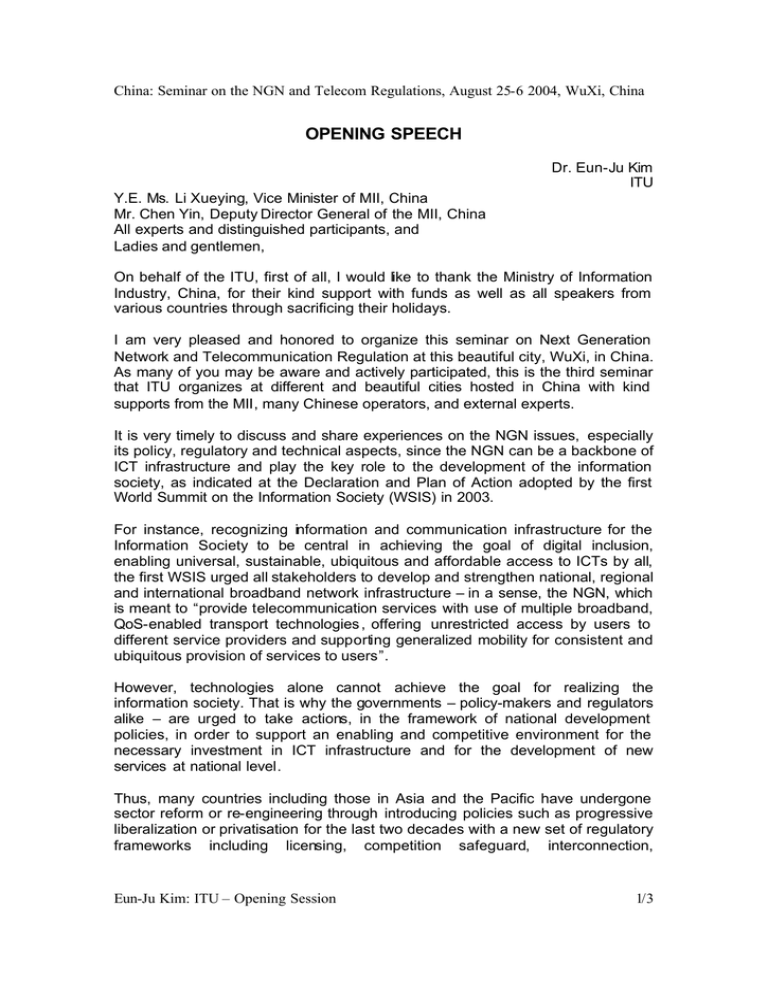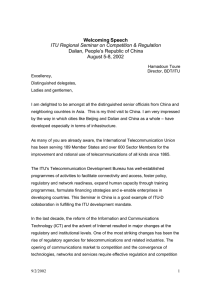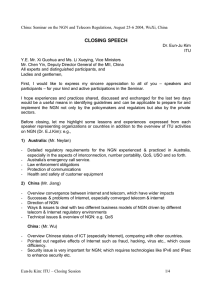OPENING SPEECH
advertisement

China: Seminar on the NGN and Telecom Regulations, August 25-6 2004, WuXi, China OPENING SPEECH Dr. Eun-Ju Kim ITU Y.E. Ms. Li Xueying, Vice Minister of MII, China Mr. Chen Yin, Deputy Director General of the MII, China All experts and distinguished participants, and Ladies and gentlemen, On behalf of the ITU, first of all, I would like to thank the Ministry of Information Industry, China, for their kind support with funds as well as all speakers from various countries through sacrificing their holidays. I am very pleased and honored to organize this seminar on Next Generation Network and Telecommunication Regulation at this beautiful city, WuXi, in China. As many of you may be aware and actively participated, this is the third seminar that ITU organizes at different and beautiful cities hosted in China with kind supports from the MII, many Chinese operators, and external experts. It is very timely to discuss and share experiences on the NGN issues, especially its policy, regulatory and technical aspects, since the NGN can be a backbone of ICT infrastructure and play the key role to the development of the information society, as indicated at the Declaration and Plan of Action adopted by the first World Summit on the Information Society (WSIS) in 2003. For instance, recognizing information and communication infrastructure for the Information Society to be central in achieving the goal of digital inclusion, enabling universal, sustainable, ubiquitous and affordable access to ICTs by all, the first WSIS urged all stakeholders to develop and strengthen national, regional and international broadband network infrastructure – in a sense, the NGN, which is meant to “provide telecommunication services with use of multiple broadband, QoS-enabled transport technologies , offering unrestricted access by users to different service providers and supporting generalized mobility for consistent and ubiquitous provision of services to users”. However, technologies alone cannot achieve the goal for realizing the information society. That is why the governments – policy-makers and regulators alike – are urged to take actions, in the framework of national development policies, in order to support an enabling and competitive environment for the necessary investment in ICT infrastructure and for the development of new services at national level. Thus, many countries including those in Asia and the Pacific have undergone sector reform or re-engineering through introducing policies such as progressive liberalization or privatisation for the last two decades with a new set of regulatory frameworks including licensing, competition safeguard, interconnection, Eun-Ju Kim: ITU – Opening Session 1/3 China: Seminar on the NGN and Telecom Regulations, August 25-6 2004, WuXi, China management of scarce resources like spectrum and numbering, universal service, quality of service, pricing etc. under the separate – if not, independent – regulators in the telecommunication sector. The more technologies, services and players at the converged ICT sector, nevertheless, the more difficulties countries – especially policy-makers and/or regulators - face: i.e., whether to extend the existing regulatory frameworks including interconnection, universal service and so forth in the telecommunication sector to the converged ICT sector, of which infrastructure will be replaced by various forms of NGN sooner than later. Ways in which each country implements the regulatory frameworks are different subject to its circumstances – i.e., no single model. For instance, some deal with and treat ICT and its services as extension of telecommunications. Others began to accommodate ICTs, as converged technologies from telecommunications, broadcasting to computers especially in the advent of Internet, through setting up a converged policy-maker or regulator, revising or re-writing ICT legislations, and regulating them with the existing or revised regulatory frameworks. At the same time, the more developed ICT infrastructure and services, the more misuses and abuses of ICTs called cyber-crimes ranging from serious hacking, fraud, virus to Spams in many countries. To tackle these challenges or emerging issues, the WSIS has also encouraged the government in cooperation wi th the private sector to strengthen the trust framework, including information and network security, authentication, privacy and consumer protection, as a prerequisite for the development of the Information Society and for building confidence among users of ICTs. Therefore, this seminar has been designed to examine not only trends and issues of the NGN from the aspects of existing regulatory frameworks but also its potentials and capabilities from those of extended regulatory regimes such as lawful tapping interception, health and safety, network control and security, and emergency services. Having recognized open, interoperable, non-discriminatory and demand-driven standards as one of the essential building blocks of the Information Society and as a prerequisite for the NGN, it will also discuss standard issues and activities led by the ITU Standardization Sector and IETF. As mentioned, there may be no “one size fits all” perfect model on regulatory frameworks for the NGN that would meet the objectives of each individual country. What ITU can do for its State and Sector Members is developing international standards, allocating appropriate radio spectrum, and identifying principles to serve as guidelines on how regulatory frameworks or regimes for the development of ICT infrastructure and applications like NGN should be optimally and indigenously developed and implemented to ensure efficient utilization in each country, taking into account its different phases of ICT development and econo-political regimes . I hope this seminar to provide China and other countries with appropriate guidelines for policy and regulation of NGN. Eun-Ju Kim: ITU – Opening Session 2/3 China: Seminar on the NGN and Telecom Regulations, August 25-6 2004, WuXi, China Last but not least, it is worth reminding that any regulatory frameworks and regimes should neither be developed nor implemented for the sake of regulations or regulators per se. Whatever the regulatory tools as guidelines we discuss and recommend today, these should be a means or option to achieve the goal – i.e., affordable, ubiquitous and quality of telecommunication and ICT services with more choices for the benefits of consumers as well as for the growth of industries at the end. Having said all, I am very glad to assist the Chinese Government in hosting the seminar on the NGN, which endeavors not only to tackle its emerging regulatory and technical issues but also to demonstrate close partnership between public and private sectors from Australia, European Commission, France, Republic of Korea, United Kingdom, United States as well as China. Now, I would like to wish every success. Thank you very much. Eun-Ju Kim: ITU – Opening Session 3/3

